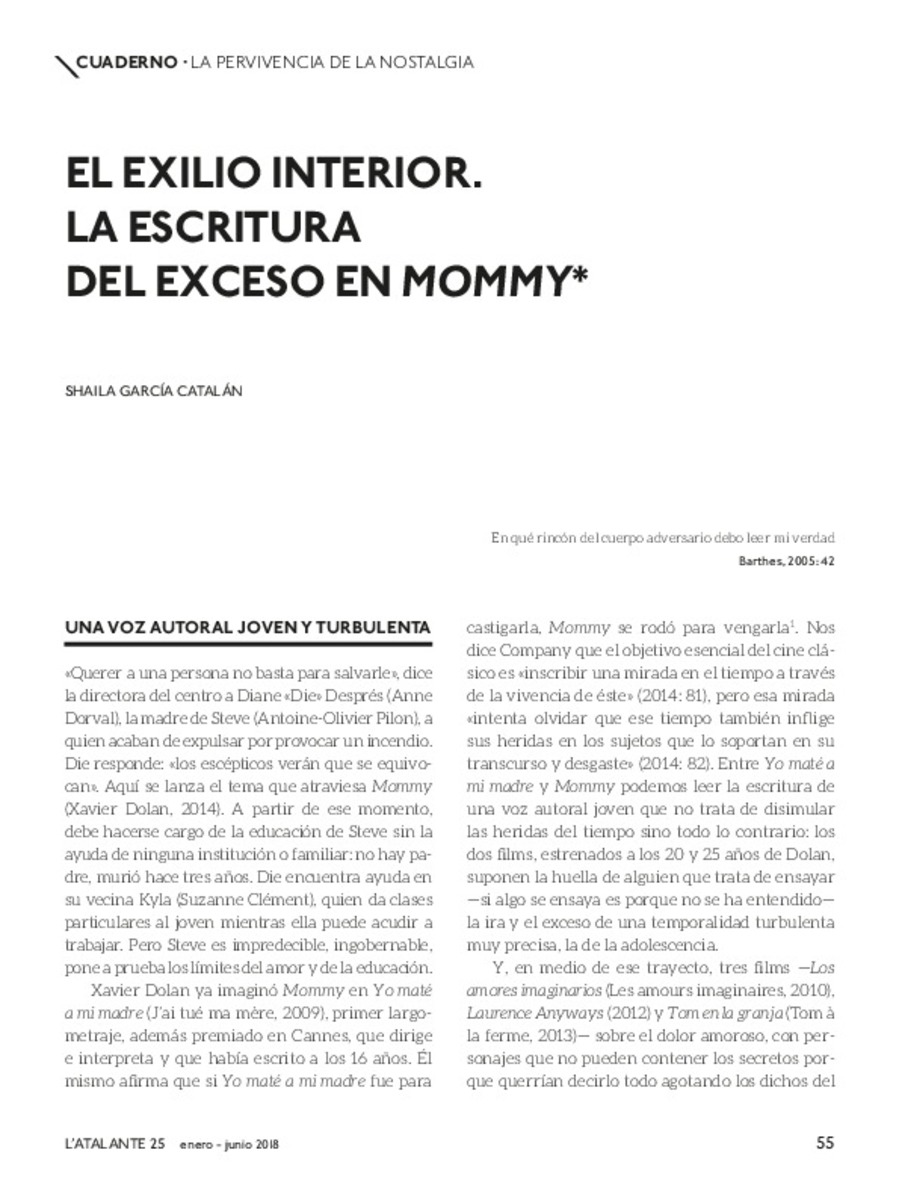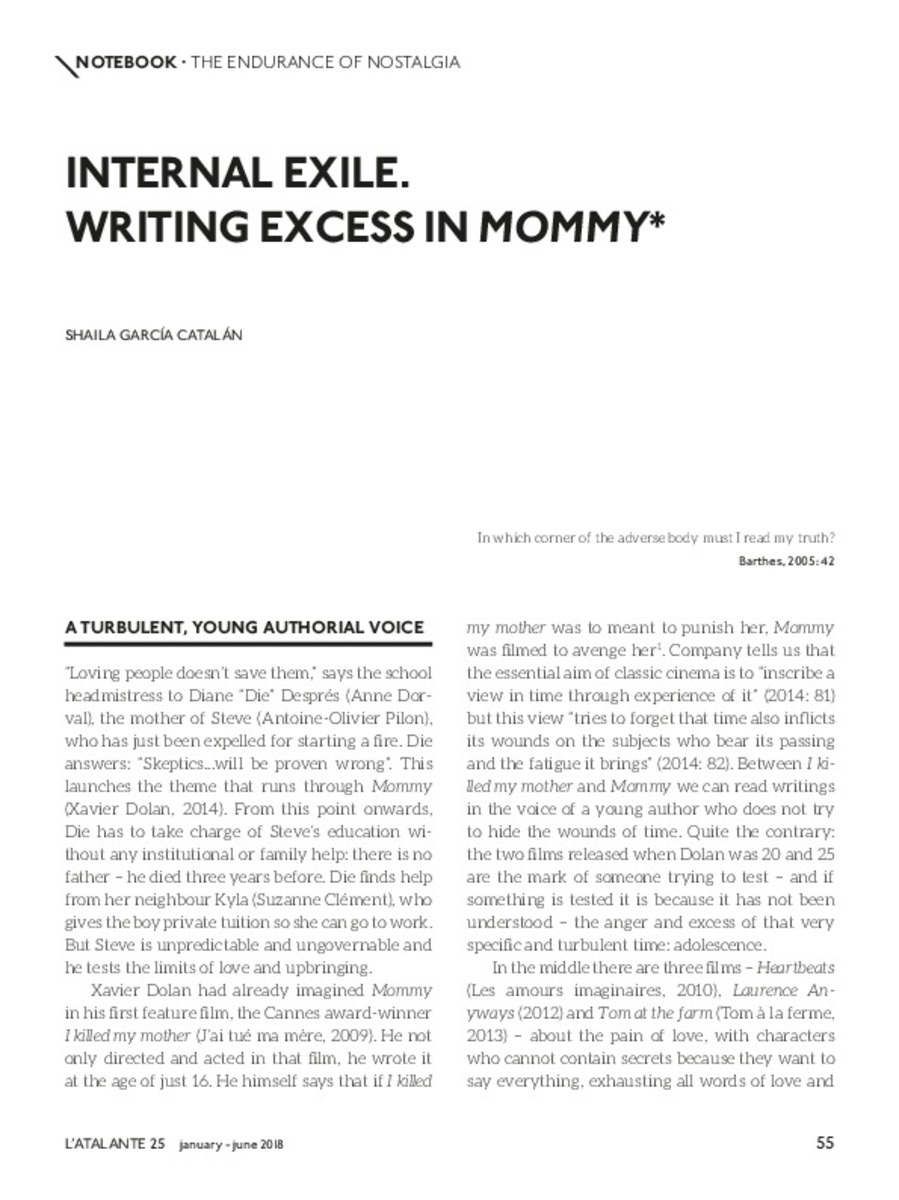Mostrar el registro sencillo del ítem
El exilio interior. La escritura del exceso en Mommy
| dc.contributor.author | Garcia Catalan, Shaila | |
| dc.date.accessioned | 2018-10-17T07:03:15Z | |
| dc.date.available | 2018-10-17T07:03:15Z | |
| dc.date.issued | 2018 | |
| dc.identifier.citation | GARCÍA CATALÁN, Shaila. El exilio interior. La escritura del exceso en Mommy. L'Atalante. Revista de estudios cinematográficos, 2018, no 25, p. 55-70. | ca_CA |
| dc.identifier.issn | 1885-3730 | |
| dc.identifier.issn | 2340-6992 | |
| dc.identifier.uri | http://hdl.handle.net/10234/176813 | |
| dc.description.abstract | Xavier Dolan ya ensayó Mommy en Yo maté a mi madre (J’ai tué ma mère, 2009), primer largometraje, además premiado en Cannes, que dirige e interpreta y que había escrito a los 16 años. Entre Yo maté a mi madre y Mommy podemos leer la escritura dolorosa de una voz autoral joven que no trata de disimular las heridas del tiempo sino todo lo contrario: los dos films, estrenados a los 20 y 25 años de Dolan, suponen una escritura de alguien que trata de ensayar la ira y el exceso de una temporalidad turbulenta muy precisa, la de la adolescencia. Por ello, Dolan despliega el melodrama desde el desbordamiento poniendo en crisis la contención hollywoodiense del género. En este texto estudiamos cómo Mommy escribe el exceso de la escritura melodramática. Para ello nos ayudamos del análisis textual como metodología sin obviar detalles de guion y conceptos del psicoanálisis. Mommy es un trabajo efusivo de la superficie que presta profunda atención a lo trágico. Su mirada melodramática es un estudio del límite hasta sus últimas consecuencias: su discurso va desde lo más íntimo (el temblor de la palabra y del cuerpo) hasta lo que lo hace marco a la subjetividad (lo familiar, lo social y lo institucional). La originalidad de su tratamiento del exceso reside en que afecta hasta el juego enunciativo con el formato del film. En definitiva, aunque el semblante de Mommy puede tomarse como un banal videoclip posmoderno, la enunciación asume la gravedad de un discurso que no retrocede ante el estudio de los afectos porque se dedica a escuchar, esto es, a humanizar lo insoportable. | ca_CA |
| dc.description.abstract | Xavier Dolan was already trying out Mommy in his first feature film, the Cannes award-winner I killed my mother (J’ai tué ma mère, 2009). He not only directed it and acted in it, he wrote it when he was just 16. Between I killed my mother and Mommy we can read painful writings in the voice of a young author who does not try to hide the wounds of time. Quite the contrary: the two films released when Dolan was 20 and 25 are the mark of someone trying to test – and if something is tested it is because it has not been understood – the anger and excess of that very specific and turbulent time: adolescence. For this reason, Dolan uses uncontained melodrama, seriously challenging Hollywood’s restrained version of the genre. In this text, we study how Mommy writes the excess of melodramatic writing. In this, we are assisted by textual analysis as our methodology, without forgetting script details and concepts from psychoanalysis. On the surface, Mommy is an effusive work paying profound attention to tragic events. Its melodramatic view is a study of limits taken to the extreme. Its discourse runs from the most intimate (trembling words and bodies) to the framework for subjectivity (the family, social and institutional factors). The originality of his treatment of excess lies in the fact that it even affects the game of enunciation with the format of the film. Ultimately, although Mommy can seem like a banal, postmodern pop video, the enunciation takes on the seriousness of an argument that does not hold back from the study of emotions because it is devoted to listening – humanising the unbearable. | ca_CA |
| dc.format.extent | 16 p. | ca_CA |
| dc.format.mimetype | application/pdf | ca_CA |
| dc.language.iso | spa | ca_CA |
| dc.language.iso | eng | ca_CA |
| dc.publisher | Associació Cineforum L´Atalante | ca_CA |
| dc.relation.isPartOf | L'Atalante. Revista de estudios cinematográficos, 2018, no 25 | ca_CA |
| dc.rights | Attribution-NonCommercial-NoDerivatives 4.0 Internacional | * |
| dc.rights.uri | http://creativecommons.org/licenses/by-nc-nd/4.0/ | * |
| dc.subject | Xavier Dolan | ca_CA |
| dc.subject | Mommy | ca_CA |
| dc.subject | melodrama | ca_CA |
| dc.subject | cine de autor | ca_CA |
| dc.subject | narrativa | ca_CA |
| dc.subject | psicoanálisis | ca_CA |
| dc.subject | guion | ca_CA |
| dc.subject | melodrama | ca_CA |
| dc.subject | auteur cinema | ca_CA |
| dc.subject | narrative | ca_CA |
| dc.subject | script | ca_CA |
| dc.subject | psychoanalysis | ca_CA |
| dc.title | El exilio interior. La escritura del exceso en Mommy | ca_CA |
| dc.title.alternative | Internal exile. Writing excess in Mommy | ca_CA |
| dc.type | info:eu-repo/semantics/article | ca_CA |
| dc.rights.accessRights | info:eu-repo/semantics/openAccess | ca_CA |
| dc.relation.publisherVersion | http://www.revistaatalante.com/index.php?journal=atalante&page=article&op=view&path%5B%5D=552 | ca_CA |
| dc.type.version | info:eu-repo/semantics/publishedVersion | ca_CA |
Ficheros en el ítem
Este ítem aparece en la(s) siguiente(s) colección(ones)
-
COM_Articles [807]









